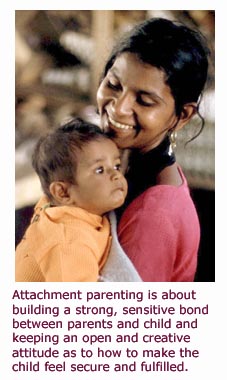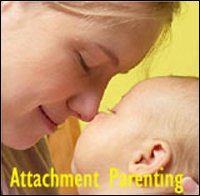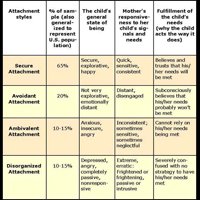What Is Attachment Parenting?
10 Sharp Truths and 2 Common Misconceptions!
Attachment parenting has become quite a 'hot' term these days ... but what is attachment parenting really about, you may ask yourself?
On this page, attachment parenting has been boiled down to the absolute essence in 10 truths.
All you need to know, in no time!
If you're the type that likes to approach a subject from all angles and therefore also want some critical reflections on what attachment parenting
is, this page will also present you with the two typical misconceptions of attachment parenting.
So What Is Attachment Parenting?
- 10 Truths That Quickly Fill You In!
1. Who's the founder of attachment parenting:
Attachment parenting is a sensitive parenting style developed by Clinical Professor of Pediatrics, Dr. Sears (William Sears or as kids call him: Dr. Bill) and his wife, Martha Sears.
2. What's the history and academic roots of attachment parenting:
Attachment parenting is inspired by attachment theory research and insights from developmental psychologist Mary Ainsworth's formulation of secure attachment - the 'healthiest' attachment style.
3. What is attachment parenting: Present Goal
The goal of attachment parenting is to empower both parents and baby and to build a happy and healthy child parent relationship between them.
4. What is attachment parenting: Future Goal
Attachment parenting focuses on quickly and consistently fulfilling your infant's or baby's physical needs (to eat, sleep etc.) and emotional needs (love, attention, security, comfort etc.) to build high self esteem and a basic sense of security, which research has proven is highly beneficial for further positive child development.
5. Who's the age group of attachment parenting:
Attachment parenting can be practiced all through childhood but the most important period is the early infant period when you and your child build your bond.
6. What is attachment parenting in practice?; How's it done:
Attachment parenting is about using your presence and intuition to get to KNOW your child - learning how to read your child, read his or her signs to find out how you may most appropriately fulfil his or her needs.
7. How do you approach attachment parenting mentally:
Attachment parenting is about keeping a positive mental attitude: Do your best to listen to your child and do your best to help - that's all a child could ask for!

8. What is attachment parenting as a parenting style?:
Attachment parenting is not about following certain rules or fixed norms. It's more about keeping an open and creative attitude to 'what really works for you and your baby'.
9. How may your friends react to attachment parenting:
Because attachment parenting is about doing what works for you and your child, it may not be what other people consider 'correct' parenting. But because you do what is needed, it is effective and positive parenting! And isn't that what really matters?
10. What are the real results of attachment parenting:
It works (at least it did for me; you can read about my personal experience of attachment parenting on my page about my high need baby). By being responsive and quickly and consistently fulfilling your child's needs, you help your baby form a positive self image ('I am loved') and develop a general sense of security, which makes exploration and independence possible.
So ironically, the more you attend to your baby's dependence by helping and feeding the needs of your baby, the more you prepare him or her to become healthily independent.
What Is Attachment Parenting Wrongly Perceived to Be?
- Common Misconceptions!
Now that you have a general idea of what attachment parenting is, you may feel somewhat sceptical.
Perhaps attachment parenting seems unreasonably hard for parents or perhaps you'd be afraid to spoil your child.
If you have reservations, that's very understandable, as attachment parenting may seem like a radical, indulgent parenting style at first glance.
But as a matter of fact, it's the most basic parenting style around.
- Attachment parenting is what you naturally do when you're not thinking too much about it: Intuitive, deep bonding with your child, which enables you to read and respond to your child's needs.
It's really that simple and we humans have been doing it throughout eons.
However, fitting a baby into our busy lives today may be stressful.
Also our western ideas of how a baby should become independent as quickly as possible tend to confuse many of us because often our baby will not adapt to our lifestyle or our heads.
When things get messed up in our heads, it's mostly because we have ideas about 'how parenting should be' or 'how our child ought to behave.
Bearing this in mind, I will now present you with the two most common objections to attachment parenting.
1. Misconception of Attachment Parenting!
- Attachment Parenting Is Unreasonably Hard!
A general objection to attachment parenting is that it's putting unnecessary pressure on already busy and tired parents by encouraging them to constantly fulfil their child's needs!
This criticism is easy enough to understand. And yes, attachment parenting is hard, especially to begin with ... BUT ...
- The more you give now, the easier it gets later!
Why?
Because by fulfilling your child's need for ... let's say, bonding or comfort as quickly as possible, you:
- Actually make your child less needy (ease the normal baby separation anxiety)
more quickly because you boost your kid's self esteem and confidence by quickly responding and help him build basic trust by teaching him that help is always available if needed.
Make life easier for yourself in the future as research has shown that secure attachment is your child's step stone to autonomy and healthy independence.
2. Misconception of Attachment Parenting!
- Attachment Parenting is an Easy Way out - Indulgence!
Okay, as the above objection to attachment parenting is: 'It's too hard', this objection assumes that attachment parenting is a permissive parenting style: taking the 'easy way out'.
What is attachment parenting thought to be by typical western line of thought:
- Indulgence ... spoiling ... an easy way out for parents who have no sense of control!
This criticism is closely tied to an important value in our society today, namely 'independence':
- It is considered good to be independent ...
- ... and bad to be dependent.
This attitude of individuality and autonomy seems also to be applied to babies.
Very often I hear, 'You must teach you child to comfort himself' or 'Your son should learn to keep himself amused'.
What people are probably really thinking, but are too polite to say is: She's a slave to her child, has no stamina to enter conflicts and her child will be all self-centred and spoilt later on.
Right!
Okay, still a bit confused as to what attachment parenting is?
That's okay but listen to this:
Attachment research and insightful experts in the general psychology of children repeatedly stressed:
When your child looks at you, he sees a mirror: himself! This means that:
- The way you see your child, the feelings you show towards your child, become the way your child will feel about him- or herself.
If you meet your child with acceptance and a positive attitude, this becomes the way your child will think about himself: Mom accepts me: I am acceptable!'
If one tends to react with anger or tends to ignore one's child when he or she is needy (and yes, sometimes impossibly irritating), the message your child gets is: 'Mom is angry and doesn't seem to like me; I will be angry with myself and not like myself' or 'Mom is ignoring my need for her, why bother reaching out for help next time'.
Yes, this may sound cryptic but your child will do anything to live up to your expectations of him ... also if they are not positive.
So when I strive to always give my child what he needs ('needs' are not the same as 'wants'), I am indirectly trying to tell him: 'I understand what you are trying to say and you can trust me / people to help if you need something!'
That doesn't mean, of course, that there aren't challenges. There are!
But when a child gets older and the needs aren't that potent and immediate anymore, my experience is that reasonable negotiation (in other words, postponing needs) becomes very easy with your child.
Why?
Because when your child has learnt that his or her need will be always responded to when you can, your child will have enough trust in you to believe that if you say that he will get what he needs later, he will.
You have shown him plenty of understanding, he has learnt that understanding feels good, and he will show it back at you. The mirror effect again, you see?
If one ignores one's child because of the thought that the child should be independent, the child may learn that when someone wants something from him or her, one may just ignore them and their needs. I know this may seem quite rigid but basically that's the mechanism.
If one enters conflicts with anger, the child learns that this must be the natural way to deal with complicated situations.
How Do I Know What Will Work Best for Me?
Now that you have the general outlines of what attachment parenting is, you may want to know if attachment parenting is something that will work for your and your baby.
We are all different! Our babies are different, our cultures are probably different, and our lives are most likely also different.
So how do you know what parenting style suits you best?
Well, there is only one way to find out:
- Just try something ... anything (still respecting your child, of course)
- How does what you do, make you feel?
- What does your gut feeling tell you about what you do?
- How does your child react to what you do?
Just try something!
Listen to your child and your gut feeling!
Then you will probably know!
If not ...
Try again!
And listen to your child and your gut feeling once more!
Really, that's all it takes!
Your Positive Parenting Ally,
Birgitte

Want to stay in touch and get the latest news?
Sign up
for my free newsletter
Parent Coaching
- For Inner Peace, Clarity and a Deeper Connection to Your Child
 Being a parent can feel like a double-edged sword. Life with kids may feel like the greatest gift you have ever received, while at the same being hugely challenging, often leaving you confused, stressed and overwhelmed.
Being a parent can feel like a double-edged sword. Life with kids may feel like the greatest gift you have ever received, while at the same being hugely challenging, often leaving you confused, stressed and overwhelmed.
When we feel like this, we've lost touch with ourselves. We can't hear our own inner voice, and it's difficult to know what is 'right' for us and how to act.
I offer in-depth parent coaching to help you regain your balance and get back in touch with yourself. From a place of inner peace and clarity, your will find your own answers which will help you reconnect with your child from a place of unconditional love and acceptance.
Read more about my parent coaching here.
Where Would You Like to Go Next?
Attachment Parenting Articles
 Attachment Parenting and Intuitive Parenting: Read Your Child Rather Than Some Book! |
Attachment Theory Articles (Scientific Angle)
 Attachment Theory is Good Basic Knowledge ... But Misses Out on Individual Infant Temperaments! |
 The Four Infant Attachment Styles: Straight to the Point, Quick Understanding! |
 Psychology Attachment Behavior; Find out When to Expect the Constant Clinging or the Letting Go of Mom's Skirt! |
 Secure or Insecure Attachment in Infancy ... Largely Shapes Who We Are Today! |
Attachment Experts
 John Bowlby: The Father of Attachment Theory |
 Mary Ainsworth: The Refiner of Attachment Theory |
 Deep Insights into the Essence Dr Sears' Attachment Parenting along with a Fascinating Historical View on the Slow Rising Consciousness of Attachment Parenting |
Attachment, High Need and Separation Anxiety
 A High Need Baby: A Strong Personality Is Great, But Where's the Off Button? |
 Baby Separation Anxiety The More Your Baby Clings, the More You Let Him! 10 Tips to Ease Baby Separation Anxiety |
 Valuable Insights into Separation Anxiety in Children and Babies: Meet Your Child with Full Acceptance and Deep Connection! |
 Facts and Fiction about the Controversial Ferber Method along with a Discussion of Its Potential Long Term Consequences |
Back to the top of this page about What Is Attachment Parenting? 10 Sharp Truths and 2 Common Misconceptions!
Go to the Positive Parenting Ally Homepage







